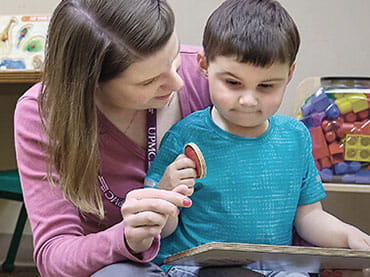"I definitely don't think Declan would be where he is if it wasn't for them."
Declan had a normal infancy until he began to transition from breastfeeding to baby food. Certain foods caused severe vomiting and unusual stools. He was diagnosed with a rare condition called Food Protein-Induced Enterocolitis Syndrome (FPIES). His allergies included bananas, milk, carrots, rice, tree nuts, and wheat.
When he was 1 year old, Declan had a severe reaction to a food that contained rice. But not only that, his development — which had been normal to that point — "went downhill," his mother Sara says.
"He was doing fine up until 1, and then he just wasn't hitting his milestones, wasn't really talking," Sara says. "He was talking before 1, he was saying 'Mama' and 'Dada.' And after that, nothing.
"Everything just stopped. It was like our world just kind of froze, if you will. He wasn't making any progress, and everything was kind of at a standstill."
Diagnosed with autism, Declan went through physical, occupational, and speech therapy through early intervention. When he hit 3 years old, he transitioned to the Intermediate Unit, which focused on school-related tasks like sitting at a desk, using scissors, and coloring.
But a significant problem remained: Declan wasn't eating. He didn't make the transition from baby food to table food. And he needed a feeding tube to get the nutrients he needed because he didn't want to eat.
"I just kind of asked his therapist, 'Where can I get help from somebody that focuses on feeding?'" Sara says. "Sitting at a desk is important, coloring is important, but what teacher is going to sit down and feed him baby food when he goes to school? Feeding is obviously so important."
Declan was referred to UPMC Pediatric Rehab, which developed a specific plan for him that focused on his individual needs. Those needs included a negative relationship with food because of the problems his FPIES caused.
Each week, Declan sees occupational therapist Lauren Rauch, MS, OTR/L; speech therapist Rebecca Skakal, CCC-SLP; and feeding therapist Kristy Engemann, CCC-SLP, for 30 minutes apiece. They focus on communicating his wants and needs, self-feeding, and tolerating food, among other priorities.
The therapy is helping Declan make progress in his relationship with food.
"Declan wasn't even touching food when he went, and he is now touching it," Sara says.
At times, there are setbacks, Sara says, and they are still using the feeding tube. But his communication has improved, as have his movement and his interaction with others.
“The girls at UPMC — Lauren, Rebecca, and Kristy — they are awesome," Sara says. "I can't even tell you how grateful I am for them. Because I definitely don't think Declan would be where he is if it wasn't for them. Declan has made a lot of great progress with them, so whatever they're doing, it's working."
Declan is continuing with his therapy, and Sara is excited to see what comes next.
“I'm definitely eager for the future," she says. "I can't wait to see what he gets into. Right now, he's so obsessed with music, so I don't know if he'll wind up playing an instrument or what he's going to do. But there's so many possibilities for him. And I hope that his feeding issues don't hold him back.
"I hope that he does great things. He definitely has the capability; we just have to get him there."
Declan didn’t choose to have autism, but we did choose UPMC.
Stories like this one have helped UPMC earn local, national, and global honors over the years. See how our commitment to Life Changing Medicine continues to receive recognition.

















